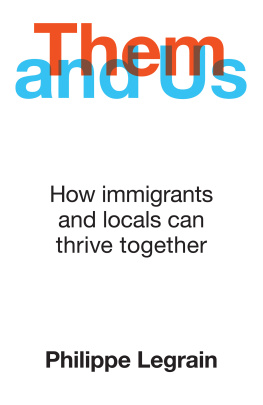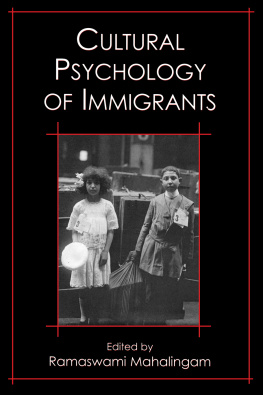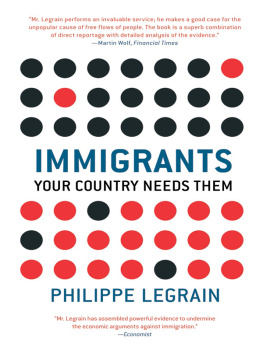PREVIOUS BOOKS BY PHILIPPE LEGRAIN
Open World: The Truth about Globalisation (2002)
Excellent The Economist
We have waited a long time. But at last a good book on globalisation has appeared wonderfully lucid and intelligent Martin Wolf, Financial Times
Immigrants: Your Country Needs Them (2007)
Shortlisted for the Financial Times Business Book of the Year award
Invaluable A superb combination of direct reportage with detailed analysis of the evidence Martin Wolf, Financial Times
Energetic and right-minded Sense as good as this needs cherishing Guardian
The single best non-technical defence of a liberal immigration policy Tyler Cowen, Marginal Revolution
Aftershock: Reshaping the World Economy after the Crisis (2010)
Legrain has a gift for combining big numbers that offer a sense of the scale while zeroing in on what all this means for people a particularly good survey of what made up the unpleasant cocktail which the world has yet to digest The Economist
European Spring: Why Our Economies and Politics are in a Mess and How to Put Them Right (2014)
Among the Financial Times Best Books of 2014
Philippe Legrain provides an original and insightful analysis of what has gone wrong with Europes economies and politics and a timely warning that the crisis ultimately threatens our open societies. Better still, he provides a blueprint for a brighter future and how to achieve it George Soros
Were British, exclaims Mike, a retired lorry driver in the small town of Boston in Lincolnshire. Were top of the league for wanting them [immigrants] out. Some of the Polish people are nice, but there are too many [Immigrations] gone too far anyway, I doubt much will change [when Britain leaves the EU]. We shouldve listened to Enoch Powell. Good old Enoch, he chuckles. His wife looks at him sternly; Powell was a Conservative politician who in 1968 foresaw rivers of blood as a result of immigration from non-white Commonwealth countries.
Boston has long been a place that people leave. Perhaps its biggest claim to fame is that migrants from there gave its name to the now much bigger American city in Massachusetts. When immigrants moved to British cities in post-war decades, they steered clear of the sleepy farming town. But that all changed when Poland and seven other east European countries joined the EU in 2004 and Britain threw open its doors to their workers. Suddenly, people flocked to Boston.
In the local fields east European migrants in fluorescent orange boiler suits now pick the healthy kale and humble spuds that end up in supermarket trolleys. Picking vegetables involves long days of hard, poorly paid work. Growers had previously relied on workers bussed in for the day during the brief harvest period, and before that on seasonal Irish migrants, explains Paul Gleeson, a former Labour councillor who produced a study of the impact of migration on the local community. But since the east Europeans arrival, local vegetable production has soared and harvesting takes place most of the year. The vegetables they pick are now processed and packaged cleaned, sorted, wrapped and barcoded locally too, as are some shipped in from elsewhere in Europe. The factory workers tend to be migrants, the supervisors and managers British.
Boston has boomed. Yet like Mike, many locals dont welcome the newcomers. I have nothing to do with them, says a market trader in the town square. If you want to see the difference in this town, take a walk along West Street. They have got nearly all the shops along there now. People are bothered by immigration because of the size of the town. Its ridiculous how many shops and supermarkets they have.
East European immigrants now account for a higher share of the population in Boston than anywhere else in Britain nearly one-ninth according to the 2011 census, and possibly twice that in 201819 according to the less accurate Annual Population Survey. The market traders feeling that They are an invading army depriving locals of resources helps explain why Boston recorded the highest Leave vote in the country in the EU referendum: 75.6 percent. And while in Britain as a whole immigration is now less of a bugbear than it was before the referendum, people in Boston are still just as bothered by it.
Immigrants have fundamentally altered the character of the town, says Jonathan Noble, a local Conservative councillor. Theyve put pressure on local hospitals, schools and housing. And theyve depressed wages in the agricultural economy.
If you walk down West Street, youll see shops called Baltic Food and European Market; so much so that some locals now dub it East Street. Yet the bustling businesses show that east Europeans are spending their wages locally, revitalising the town centre. Many stores used to be boarded up, Gleeson explains. (Noble also acknowledges immigrants entrepreneurial contribution.)
Gleesons report debunked local misperceptions about the newcomers. For all the grumbling about boozy east European young men causing a ruckus, police recorded more public-order offences by local people. Contrary to fears that immigrants were a welfare burden, hardly any claimed unemployment benefits.
Yet Noble emphasises the pressure on local services. Because of all the extra immigrants, local people are waiting longer to see a doctor. At one secondary school 40 percent of the children are foreign nationals. Some learn English quickly; others dont.
There has been pressure on public services, Gleeson acknowledges. But immigrants arent to blame. The pressure is due to austerity and a failure of the authorities to adjust quickly enough to a rise in the local population. And all the newcomers arent being counted properly, so local services arent receiving adequate funding from central government.
Thats a fair point, Noble concedes. We havent had our fair share of government funding. Its incumbent on government to be more generous. But its not much help to a local person struggling to see their GP [primary doctor]. True but its no reason to blame newcomers for government failure.
The cost of housing is another issue. Even though wages in Boston are low, we have the highest rents in Lincolnshire, Noble exclaims. Yet as he later points out, some east Europeans live in mobile homes on farmers land, so do not compete with locals for housing. Others live in crowded, shared accommodation, so occupy much less space than retirees who have moved to Boston from elsewhere in Britain. Insofar as newcomers do drive up local demand for housing, the real issue is that planning restrictions, local nimbyism (not in my back yard) and the cost of building on a flood plain have all prevented the construction of enough new homes to accommodate Bostons rising population.
Perhaps the biggest gripe is that the migrants have harmed locals job prospects. Marius Wlodarczyk, a factory worker from Poland, says he can feel the tension with local people. They dont like us much. They keep saying that were taking their jobs and theyre blaming us, he said. There are some very angry people out there, says Robin Hunter-Clarke, formerly a local UK Independence Party activist. Its mainly about jobs. Theres too many people in the low-skilled labour market.
Undeniably, workers in Britain have had a torrid time since the financial crisis. Allowing for inflation, median wages were still lower in 2019 than their 2008 peak. Moreover, pay in Boston is well below the national average. So it is perhaps understandable that locals attribute their crimped pay packets to the influx of east Europeans.
But while Boston was already poor before the east Europeans arrival, wages there have not fallen further behind the rest of the country since then. In 2004 local median wages were 69.3 percent of the national average; in 2016 they were 69.1 percent. That local experience in the area of Britain that has received the biggest influx of east Europeans chimes with the national evidence that immigrants typically do not depress British peoples wages significantly. On the contrary, they tend to boost Britons earnings and living standards.
Next page









